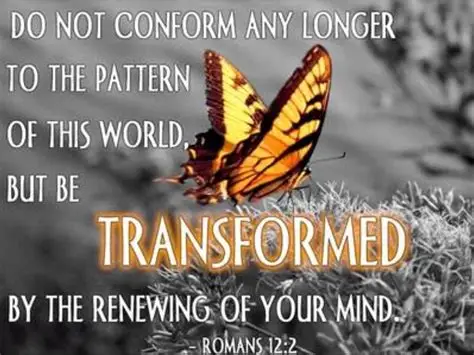BE TRANSFORMED IN CHRIST
THE SEED
“And do not be conformed to this world, but be transformed by the renewing of your mind, that you may prove what is that good and acceptable and perfect will of God.” Romans 12:2 (NKJV)
Transformation in Christ means a complete renewal of the mind and heart, turning away from worldly influences and aligning with God’s will. This change occurs when we receive Jesus as our Lord and Saviour. In that moment, we become new creations, born again as children of God, and filled with His Spirit. Our thoughts, attitudes, and behaviours shift, reflecting the holiness and righteousness that come from walking with Christ. Those who were once distant from God are drawn closer through the sacrifice of Jesus. Transformation is not limited to those who have never known Christ; it is also for those who have strayed but desire to return as well as for believers who enjoy it as a lifelong process. Many biblical figures experienced this renewal. Moses went from being a fugitive to leading the Israelites to freedom. Zacchaeus, a tax collector known for his dishonesty, encountered Jesus and was so moved that he repented, choosing to give half of his wealth to the poor and repay those he had wronged. Rahab, once living a sinful life in Jericho, turned to God and was ultimately included in the lineage of Christ. David, a humble shepherd, was transformed into a mighty king, and Peter, who once denied Jesus, became a bold preacher of the gospel. A transformed life is marked by righteousness, unwavering faith, deep trust in God, and a commitment to prayer and holiness. It reflects discipline and a heart fully surrendered to Christ. When we allow God to renew us, our lives become living testimonies of His grace, bearing fruit that brings Him glory.
BIBLE READING: 2 Corinthians 3:10–18
PRAYER: God, transform my life, mind, heart, soul, and strength so that I may belong to You forever. Let my life be a sanctuary for Your glory to shine. Amen.
A TI YÍ PADÀ NÍNÚ KRISTI
IRUGBIN NAA
“Ẹ má sì ṣe àfarawé ayé yìí, ṣùgbọ́n ẹ di yíyípadà
nípa ìsọdọ̀tun inú ọkàn yín, kí ẹ̀yin lè dánwò ohun tí ó jẹ́ ìfẹ́ Ọlọ́run, tí ó dára, tí ó ṣe ìtẹ́wọ́gbà àti tí ó pé.” Róòmù 12:2 (NKJV).
Àyípadà nínú Kristi túmọ̀ sí ìsọdọ̀tun pípé ti inú ọkàn àti ọkàn, yíyí kúrò nínú ipa ayé kí a sì tẹ̀ lé ìfẹ́ Ọlọ́run. Ìyípadà yìí ń ṣẹlẹ̀ nígbà tí a bá gba Jésù gẹ́gẹ́ bí Olúwa àti Olùgbàlà wa. Ní àkókò náà, a di ẹ̀dá tuntun, a tún bí wa gẹ́gẹ́ bí ọmọ Ọlọ́run, a sì kún fún Ẹ̀mí Rẹ̀. Àwọn èrò wa, ìwà wa, àti ìhùwàsí wa yí padà, tí ń fi ìwà mímọ́ àti òdodo hàn tí ó wá láti rírìn pẹ̀lú Kristi. Àwọn tí wọ́n jìnnà sí Ọlọ́run tẹ́lẹ̀ di fífà súnmọ́ nípa ẹbọ Jésù. Àyípadà kò kan àwọn tí wọn kò mọ Kristi rí nìkan; ó tún wà fún àwọn tí wọ́n ti sínà ṣùgbọ́n tí wọ́n fẹ́ padà bakannáà fún àwọn onígbàgbọ́ tí wọ́n ń gbádùn rẹ̀ gẹ́gẹ́ bí ìgbésí ayé tó gùn. Ọ̀pọ̀lọpọ̀ àwọn ẹ̀dá Bíbélì ni ó ní ìrírí ìsọdọ̀tun yìí. Mósè lọ láti di ìsáǹsá sí píṣẹ́ àwọn ọmọ Ísráẹ́lì sí òmìnira. Sakéù, agbowóòdè tí a mọ̀ fún àìṣòótọ́ rẹ̀, pàdé Jésù, inú rẹ̀ sì dùn tó bẹ́ẹ̀ tí ó ronúpìwàdà, tí ó yan láti fi ìdájì ọrọ̀ rẹ̀ fún àwọn òtòṣì kí ó sì san padà àwọn tí ó ti ṣe abúrú fún. Ráhábù, tí ó ti ń gbé ìgbé ayé ẹ̀ṣẹ̀ ní Jériko, yí padà sí Ọlọ́run, a sì gbà á mọ́ inú ìran ẹbí ìtàn Kristi. Dáfídì, olùṣọ́-àgùntàn tí ó rẹ̀lẹ̀, di yíyípadà sí ọba alágbára, Pétérù, ẹni tí ó sẹ́ Jésù tẹ́lẹ̀, di òjíṣẹ́ aláforíjinlẹ̀ ti ìyìnrere. Ìgbé ayé tí a yí padà jẹ́ àmì òdodo, ìgbàgbọ́ tí kò ṣíṣẹ́, ìgbẹ́kẹ̀lé Ọlọ́run jíjinlẹ̀, àti ìfaramọ́ àdúrà àti ìwà mímọ́. Ó ń fi ìkọ́ àti ọkàn tí ó jọwọ́ ara rẹ̀ fún Kristi pátápátá hàn. Nígbà tí a bá fún Ọlọ́run láàyè láti sọ wá di tuntun, ìgbé ayé wa di ẹ̀rí ìyè ti oore-ọ̀fẹ́ Rẹ̀, tí ń so èso tí ń mú ògo bá A.
BIBELI KIKA: 2 Kọ́ríńtì 3:10–18.
ADURA: Ọlọrun, yí ìgbé ayé mi, inú ọkàn, àyà, àti agbára mi padà kí ń lè jẹ́ Tìrẹ títí láé. Jẹ́ kí ìgbé ayé mi di ibi mímọ́ fún ògo Rẹ láti tàn. Àmín.
